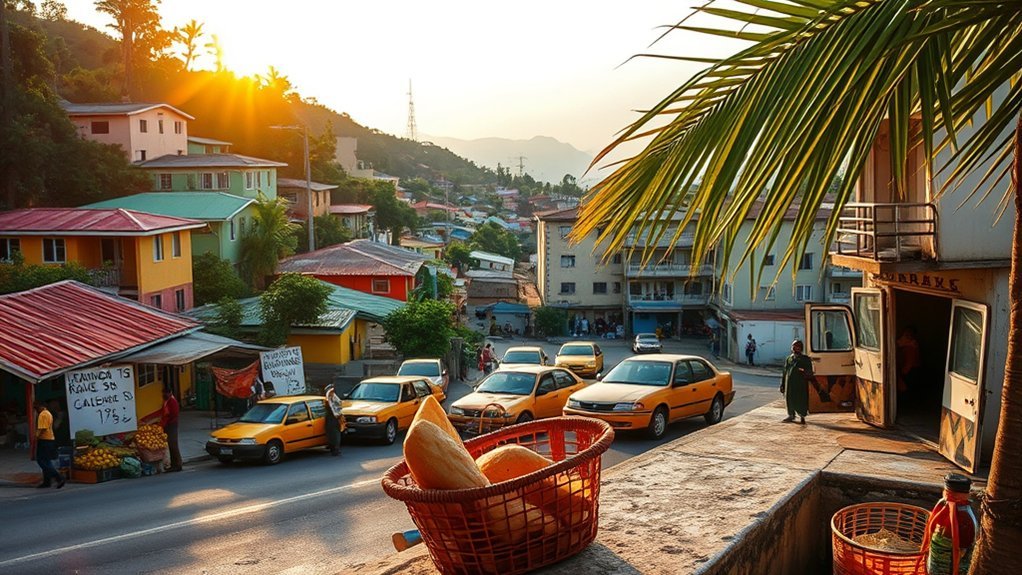You can live reasonably well in Jamaica for about $1,100–$1,800 per month outside Kingston, with Kingston costs often rising toward $2,500+ if you want private healthcare and gated security. Rent ranges roughly $400–$1,000 for one‑bedrooms depending on city, while utilities and internet add another $100–300. Public healthcare is free but crowded; private plans run from ~$3,000 to $40,000 yearly. Keep reading to see detailed budgeting, residency, and safety tradeoffs.
Average Cost to Retire in Jamaica
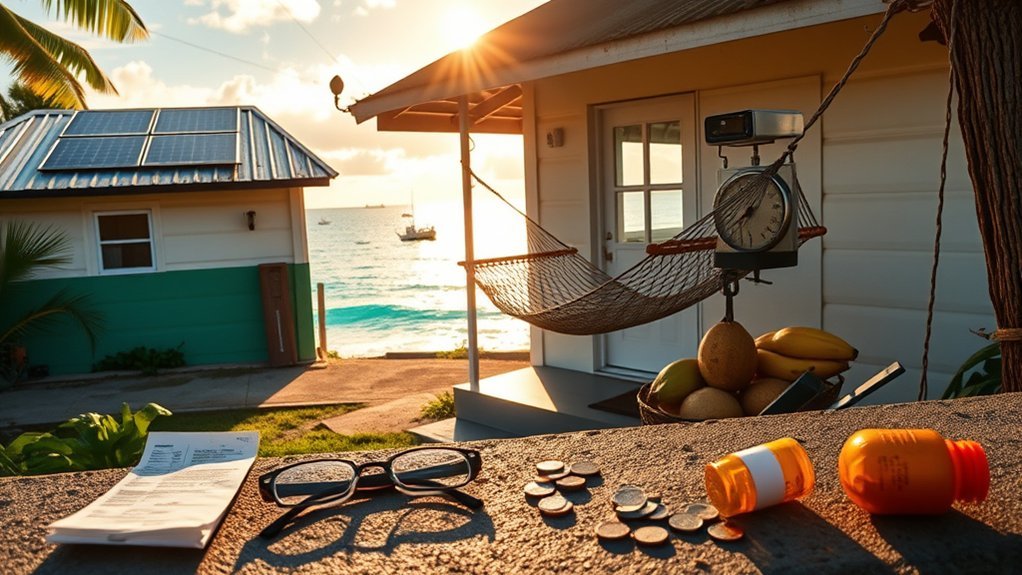
If you’re retiring in Jamaica, expect living costs roughly 22% below U.S. levels: plan on about $913 a month for day‑to‑day expenses (not including rent) and rent that can span roughly $190–$1,200 monthly depending on location—Kingston one‑bedrooms average near $900.
For a clear picture of the average cost to retire in Jamaica, combine the $913 baseline with your targeted rent: low‑end residents might live on roughly $1,100 monthly including modest rent, while renting in Kingston pushes typical totals toward $1,800.
Factor in health coverage: public care is free, but many retirees choose private plans that run roughly $3,000–$40,000 annually, a decisive variable in your budget.
Public healthcare is free, but many retirees opt for private plans costing roughly $3,000–$40,000 yearly.
If you spend six months or more locally, expect local tax obligations, though Jamaican authorities don’t tax U.S. Social Security.
Use these data points to compare scenarios and set a retirement income target that reflects your housing choice and preferred healthcare level.
Housing, Utilities and Monthly Budgets
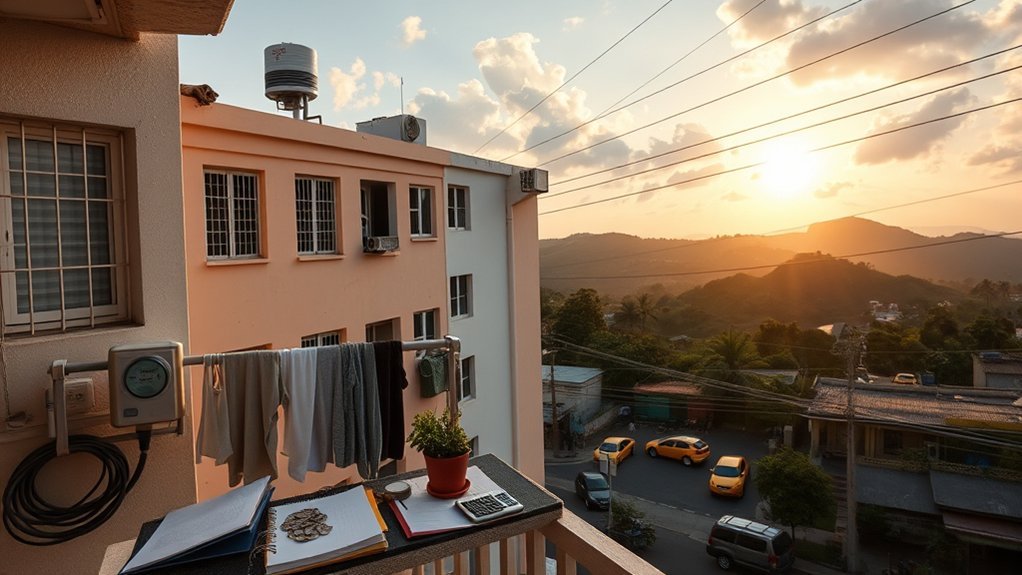
Now that you’ve seen broad retirement cost ranges, let’s look at housing, utilities and how they shape your monthly budget. You’ll find one-bedroom housing in Kingston runs JMD 70,000–150,000 (USD 450–1,000); Montego Bay and Ocho Rios are cheaper at JMD 60,000–90,000 (USD 400–600). Utilities add predictable overhead: electricity JMD 15,000–20,000 (USD 100–135), water/garbage JMD 3,000–5,000 (USD 20–35), internet/cable JMD 7,000–10,000 (USD 45–65).
| Item | Typical Monthly Cost |
|---|---|
| Kingston 1BR rent | JMD 70,000–150,000 |
| Coastal 1BR rent | JMD 60,000–90,000 |
For non-rent living expenses expect JMD 300,000–800,000 (USD 2,000–5,200) depending on lifestyle and family size. Compare total scenarios: a single in Kingston should budget rent plus utilities (~JMD 95,000–185,000), while coastal living reduces rent but keeps utilities similar. Use these ranges to build a precise monthly budget.
Healthcare Options and Costs
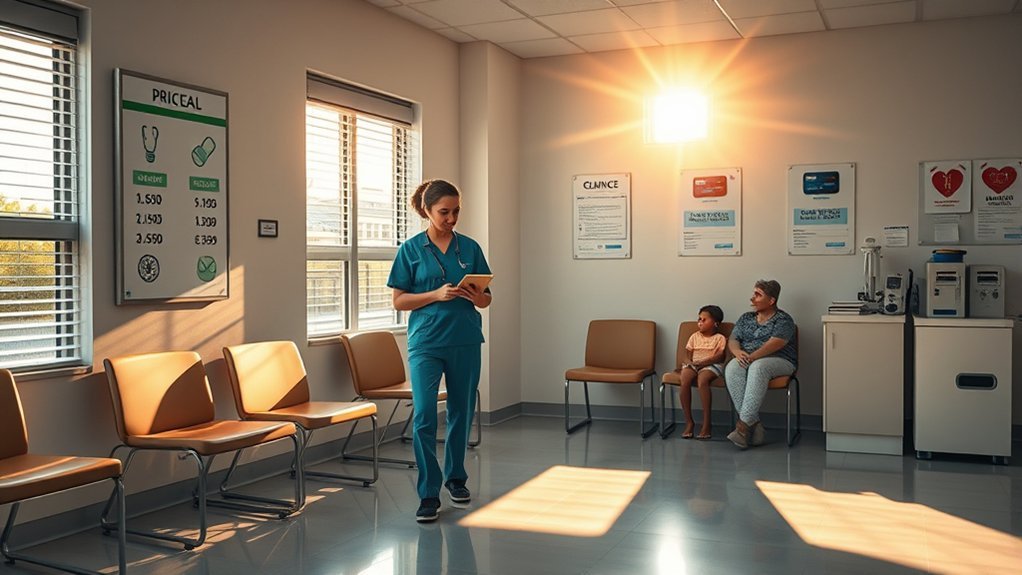
You’ll find free public healthcare for residents, but it’s often overcrowded with long waits compared with faster private clinics.
Private visits typically cost JMD 5,000–10,000 (USD 35–70) per visit and private international insurance runs roughly USD 3,000–40,000 annually.
Basic local premiums are about JMD 20,000–50,000 (USD 135–330) per month, and the best hospitals are concentrated in Kingston and Montego Bay.
Public Vs Private Care
While public healthcare in Jamaica is free for residents, it’s often overcrowded with long waits, so many people turn to private providers for faster, higher-quality care.
You’ll weigh trade-offs: zero-cost access versus speed and perceived quality. Private clinics charge JMD 5,000–10,000 (USD 35–70) per visit; out-of-pocket costs can climb for procedures.
Basic local insurance (JMD 20,000–50,000 / USD 135–330 monthly) offsets private fees, while international plans (USD 3,000–40,000 annually) offer broader networks.
Use public healthcare for routine, non-urgent needs; choose private care for timely diagnostics or specialist access.
- Cost: public healthcare = free; private = pay-per-visit or insurance-assisted.
- Wait times: public long; private short.
- Quality: public variable; private generally higher.
- Financial planning: factor visit and insurance costs.
Insurance and Costs
If you prefer private care for speed or specialists, you’ll need to budget for insurance and out-of-pocket costs.
Basic health insurance typically runs JMD 20,000–50,000 (USD 135–330) per month; that covers many private clinic visits but may not cover all prescriptions.
Private consultations cost JMD 5,000–10,000 (USD 35–70) each, so without insurance you’ll spend quickly.
Public healthcare is free but often overcrowded, which is why many choose private options.
As an expatriate you should consider international insurance—annual premiums range widely, roughly USD 3,000–40,000 depending on coverage and evacuation benefits.
Compare plan deductibles, prescription caps, and provider networks to estimate realistic annual healthcare spending in Jamaica.
Visas, Residency and Tax Considerations
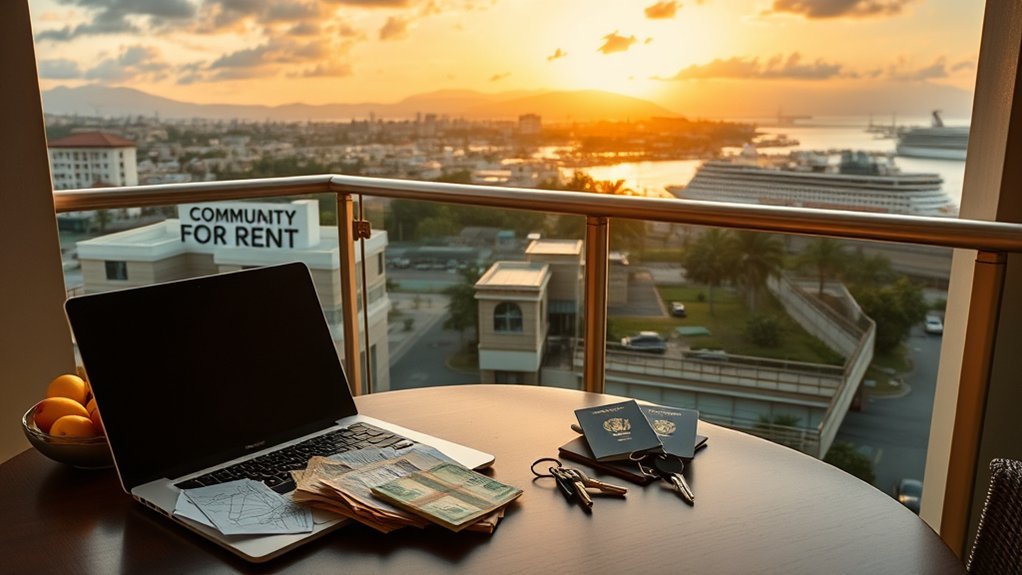
If you plan to stay longer than six months in Jamaica you’ll need residency and must show proof of financial support when applying—applications can be filed at the Jamaican consulate in the U.S.
For retirees, tax exposure depends on status and income: statutory income over J$1,700,088 is taxed at 25% and over J$6,000,000 at 30%, while Jamaican law doesn’t tax Social Security though the U.S. may.
Compare that to U.S. rules and the U.S.–Jamaica treaty, which aims to prevent double taxation but means you could still face U.S. tax obligations on some retirement income.
Residency Application Requirements
1 clear step when planning a long-term move to Jamaica is understanding visa, residency and tax rules, because Americans get up to six months visa-free but must secure residency (with proof of financial support) to stay longer.
You’ll apply for residency status at the Jamaican consulate in the U.S.; approval isn’t guaranteed, so confirm your ability to remain before relocating.
- Prepare proof of financial support (bank statements, pension documents) — mandatory for application.
- Submit forms and biometric requirements at the consulate; processing times vary.
- Compare tax exposure: spending ≥6 months or owning property can trigger Jamaican taxes, though treaty prevents double taxation.
- Note rates: statutory income taxed 25% over JMD 1,700,088, rising to 30% over JMD 6,000,000; SS income untaxed.
Tax Implications for Retirees
Because you’ll trigger Jamaican tax rules once you stay six months or own property, plan residency and income sources together: tax implications for retirees hinge on residency, income type, and rates.
If you stay ≥6 months or own property, Jamaica taxes statutory income at 25% over JMD 1,700,088 and 30% over JMD 6,000,000. Social Security isn’t taxed by Jamaica, though the U.S. may tax it.
U.S. pensions remain subject to U.S. tax, not Jamaican tax, so you can often avoid double taxation on pension income but must file appropriately. Americans may stay six months visa-free; longer stays require residency with proof of financial support and aren’t guaranteed.
Compare projected Jamaican tax on local income versus continuing U.S. tax liabilities before relocating.
Safety, Crime and Local Living Conditions
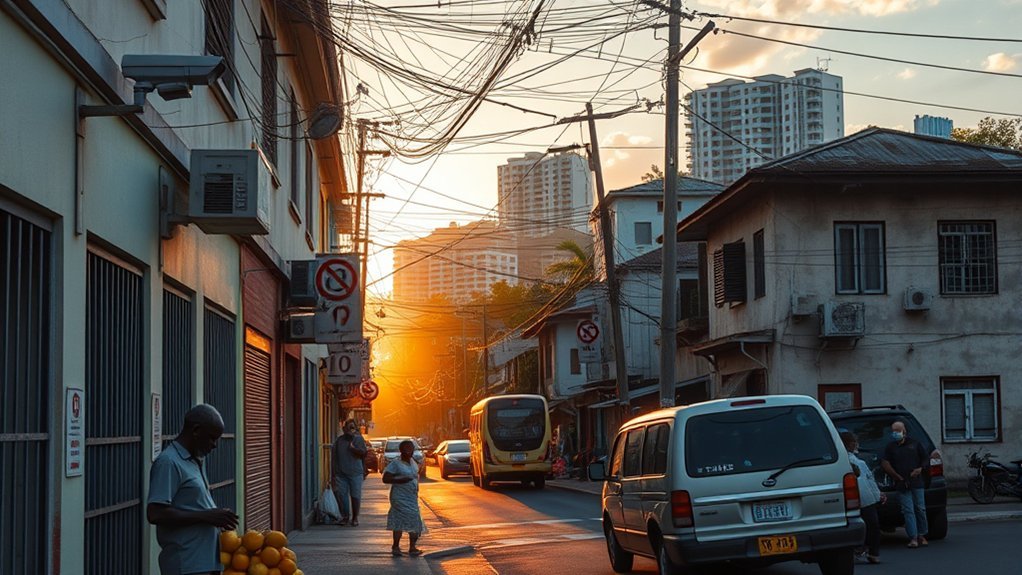
While Jamaica offers vibrant culture and affordable living compared with many Western countries, you should be aware that crime rates remain high and the U.S. State Department issues travel advisories citing risks of violent crime, including armed robberies and sexual assaults.
While Jamaica’s culture and affordability shine, high crime rates and State Department advisories warrant cautious travel and safety planning
You’ll need to factor safety into location choice, daily routines, and housing costs, since private security and gated communities are common expenses. Public healthcare is often overcrowded, so many residents pay more for private clinics to avoid long waits. Emergency response times are slower, which can influence your decision about where to live.
- Assess regional variation: crime and safety differ sharply by parish and neighborhood.
- Budget for security: gated housing, alarms, or private guards increase monthly costs.
- Opt for private healthcare: faster access but higher out-of-pocket spending compared to public hospitals.
- Plan travel carefully: avoid high-risk areas, especially at night, to reduce personal risk and insurance premiums.
Saving Strategies and Affordable Caribbean Alternatives
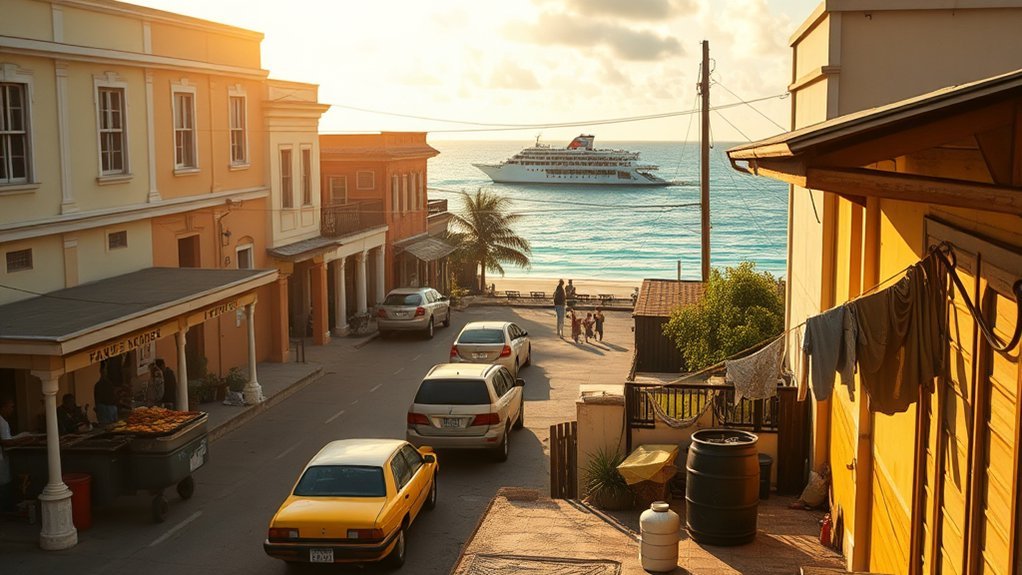
If you want to cut living costs in Jamaica without sacrificing quality of life, focus on location, local sourcing, and transport choices: smaller towns like Negril or Port Antonio can offer coastal homes under $200/ft² versus much higher prices in Kingston and Montego Bay; weekly groceries from local markets typically run JMD 6,000–10,000 (USD 40–65) compared with higher supermarket bills; city fares for minibuses and shared taxis (JMD 500–1,000 or USD 3–7) beat car ownership and its insurance and fuel costs; and eating at local eateries (about JMD 1,200–1,500 per meal) helps you target a monthly budget between JMD 300,000 and JMD 800,000 (USD 2,000–5,200) depending on priorities. Use these saving strategies: relocate to lower-cost towns, buy local produce, rely on public transit, and choose casual dining. Below compares typical costs to illustrate choices.
| Category | Typical cost |
|---|---|
| Housing (coastal) | < $200/ft² |
| Groceries (weekly) | JMD 6,000–10,000 |
| Transport (per trip) | JMD 500–1,000 |
| Meal (local) | JMD 1,200–1,500 |
Frequently Asked Questions
Can US Citizens Live in Jamaica?
Yes — you can live in Jamaica short-term without a visa for up to six months; longer stays require residency applications. Compare Visa Requirements, tax obligations, and consult legal/financial experts to guarantee compliance and suitability.
What Will $20 US Dollars Buy in Jamaica Today?
Like a small key revealing options, you can buy Local Purchases: 2–3 fast meals, a basic grocery pack, multiple bus rides, 2–4 beers, or entry to local attractions — cheaper compared to many Western prices.
How Much Is the Average Rent in Jamaica in US Dollars?
Average rental prices in Jamaica range roughly USD 400–1,000 for a one-bedroom monthly. You’ll pay about USD 450–1,000 in Kingston and USD 400–600 in Montego Bay/Ocho Rios; urban areas command higher Rental Prices.
Is Jamaica a Good Place to Live?
Think of Jamaica as a Caribbean compromise: you’ll enjoy varied lifestyle factors, lower costs than the U.S., free public healthcare with private alternatives, safety tradeoffs, and education expenses—so it’s good if your priorities match those tradeoffs.
Conclusion
You can retire in Jamaica for roughly $1,800–$3,500 monthly depending on lifestyle; notably, average rent in Kingston is about 40% lower than Miami’s. If you want quieter towns and lower costs, expect closer to $1,500–$2,200. Factor in private healthcare premiums, utility variability, and residency paperwork. Compared to other Caribbean islands, Jamaica offers a compelling cost-to-service ratio, so weigh safety, tax rules, and your required comfort level before deciding.

